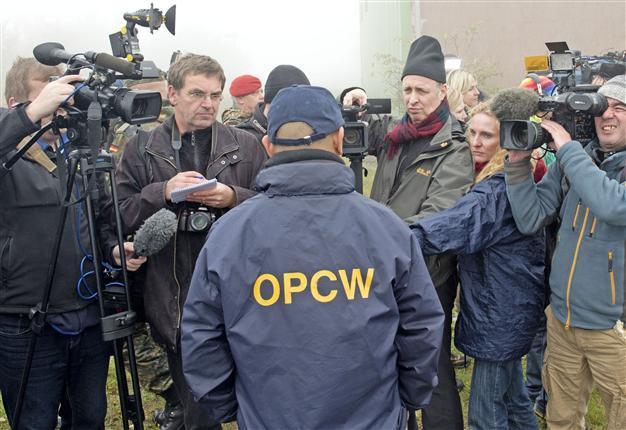Chemical watchdog says half Syria inspection work done
THE HAGUE - Agence France-Presse

Franz Ontal, OPCW's head of inspector training, center, talks with journalists after a training session with U.N. inspectors of the Organization for the Prohibition of Chemical Weapons, OPCW, in the German Armed Forces training center in Wildflecken, Germany, Wednesday, Oct. 16, 2013. AP Photo
The world's chemical weapons watchdog said Thursday that it had completed nearly half its inspections of Syria's arsenal, despite working against a background of car bombings and mortar attacks.
"We have done nearly 50 percent of the verification work of the facilities that have been declared to us," Malik Ellahi, a political advisor on Syria for the Organisation for the Prohibition of Chemical Weapons, told journalists in The Hague.
Despite the progress towards destroying Syria's arsenal by mid-2014, Ellahi said security remained a concern for the unprecedented mission in a war zone.
Several car bombs exploded near the inspectors' Damascus hotel on Saturday, and mortars fell as recently as Wednesday night, giving "some cause for concern", said Ellahi, who advises OPCW Director-General Ahmet Uzumcu.
Nevertheless, the "security situation has not impeded any of their work," he said.
"Naturally it is a matter of concern to us, but the team remains determined and the morale is high," he said.
The OPCW said on Wednesday that its inspectors had checked 11 out of 20 sites identified by Damascus and destroyed chemical weapons equipment at six sites.
Inspectors are making "good progress" in making chemical sites inoperable, he said, although "a few" sites remain inaccessible for security reasons.
The organisation, which last week was awarded the Nobel Peace Prize, and the United Nations currently have about 60 experts working in Syria to eradicate chemical weapons, around a month after the OPCW accepted President Bashar al-Assad's application to join the Chemical Weapons Convention, in a bid to stave off a possible Western military strike.
Syria formally joined the convention on Monday.
So far Syria has won rare praise for its cooperation with the inspectors, but the UN has stressed that key deadlines in the destruction of Syria's chemical weapons should be met.
This included verifying Syria's disclosed chemical weapons, identifying key equipment, destroying production facilities and starting the destruction of Category 3 chemical weapons by November 1.
"If some sites remain inaccessible by the time some of the timelines are upon us, this will be reported in a very objective manner to the (OPCW's) Executive Council," Ellahi said.
"I am sure the council will take into account the circumstances and provide guidance as how we will move forward," he said.
Inspectors have until June 30 next year to complete the destruction of Syria's chemical arsenal.
The United States threatened a military strike after an August 21 chemical weapons attack near Damascus in which hundreds of people died.
Under a disarmament plan that has been given added force by a UN Security Council resolution, Damascus now has until mid-next year to get rid of its reported stocks of sarin, mustard and VX gas.
Syria must give the OPCW a plan for destroying its estimated stockpile of 1,000 tonnes of chemicals by October 27 -- one month after the Security Council Resolution.
By November 15, the OPCW will have set out a detailed plan with a timetable for the destruction of actual chemicals.
Russia and the Unites States, which drew up the disarmament plan, are still working with the OPCW on how to destroy the chemicals, diplomats said at the UN on Monday.
Russia has proposed building at least one furnace in Syria to burn it, they said.
However, OPCW and UN experts have doubts whether a furnace can be installed while the conflict, which has left more than 100,000 people dead since March 2011, rages on.
